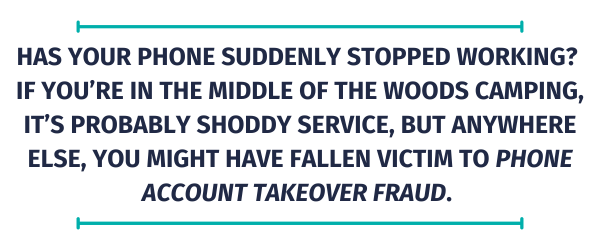Stay Safe: Top Fraud Trends of 2025 You Need to Know
04/25/2025
By: Conor Moreau, Emily Brassley

Sometimes, it feels like you need a degree specializing in cybersecurity to keep up with all the trending scams, but don't worry; we're here to help. I spent months sitting in the dark with only a laptop screen as light, trying to get into the mind of a fraudster. When that didn't work and only made my eyesight worse - I switched to focusing on researching and reviewing the latest trending attempts at fraud that could target YOU!
Knowledge is only half the battle but knowing what to look out for should help prepare you if a fraudster sets their sights on you. So what do you know about Home Title Fraud, Account Takeovers, Phishing, and Smishing Campaigns?

Dude, Where's My House?
Homeowners are facing a new type of fraud - a scam that steals the house right from underneath them. Home Title Fraud sees scammers using forged documents to 'prove' that ownership of a property changed plans.
So you own a home, the scammer forges a fake deed and then SELLS the home to a new owner. The scam can take many forms - sometimes, they falsely rent out the property or even secure a mortgage for a home that's not theirs. Then, before anyone realizes what happened, they've taken the money and run.
According to the FBI, over 260 Mainers lost $6,253,008 to home title fraud (Setera).
So, a scammer sells your fake deed, and then you need to go to court to recover what's rightfully yours - leaving both you and the person who bought the fake title as victims.
Homeowners should:
- Keep an eye on utilities - if you stop receiving bills or notices, contact your providers and find out why - chances are they're not just being nice.
- SIGN UP FOR TITLE ALERTS - if your county clerk's office provides title alerts, ensure you receive them for your property.
- Check online property records for any recorded deed changes.
HERE PHISHY PHISHY
Phishing campaigns never go away; like a school of fish, they just keep swimming along.
There's been a rise in Smishing Campaigns (text phishing) related to toll services. Victims will receive texts stating they didn't pay for a highway toll with a link for payment that will just put the money in the scammer's pocket. They'll also pretend to be toll service products like FasTrak, E-ZPass, and I-Pass to convince users there was an issue with their payment tied to the account.
Fake phone calls, scam texts, and emails laden with sketchy links can be a lot to keep up with.
- Always double-check the sender - scammers will spoof established numbers or email addresses to be off in a slight manner so you won't notice.
- Unsure about an email? Avoid falling for a phishing campaign by logging directly into a website instead of clicking the links embedded in the email.
- Reach out independently to the company to confirm the validity of the communication - ESPECIALLY if the email is trying to get you to act URGENTLY.
Want more tips on how to avoid falling for phishing scams? Check out our blog: Fight Fraud, Trust Your Gut, and Avoid These New Scams.

No, That's MY Account.
Has your phone suddenly stopped working? Texts won't send. Calls won't go through.
If you’re in the middle of the woods camping, it's probably shoddy service, but anywhere else, you might have fallen victim to Phone Account Takeover Fraud.
If you were old enough to have a wired phone your phone number was included in the yellow pages for anyone to find. Now, you're an outlier if you DON'T have a cellphone, but the last thing you want is your number to be listed for anyone to see.
Scammers will use information listed in leaks, phishing emails, or public directories to obtain your phone number.
Once they have your number, they'll call the phone company impersonating you and have the number switched to a new SIM card/phone, allowing them to receive your texts, calls, and messages, opening you up to a whole new world of danger.
It's one of many reasons we suggest NOT using text as a means of multifactor authentication. Want to know more? Check out our blog: Protect What Matters Most; Embrace Multifactor Authentication Now.

WHAT ELSE CAN YOU DO?
- ALWAYS update your devices - when your phone or computer prompts you with a new update, it also includes the latest security patches to protect you.
- NEVER give out your banking information to anyone who requests it over the phone or the internet. No one from Atlantic will ever request your digital banking log-on information; always keep it private.
- If you've fallen victim to fraud, the first thing you should do is report it!
- Regularly change your passwords - and don't reuse them. If your password is in a leak and you use it everywhere, then multiple accounts are at risk.
- No company will contact you requesting your login and password or other sensitive information, ESPECIALLY over the phone.
Want to know more about what to do if you DO fall victim to fraud? Check out our blog: How to Recover from Being a Fraud Victim.
We're Here to Help!
Our Financial Tips to Do Better will help keep you updated with the latest fraud attempts so that you can protect yourself from scammers. If you fall victim to fraud - you should never feel ashamed and hide it. That's what scammers want!
If you suspect you were targeted by a scam or have been a victim of fraud, please contact us immediately. Financial security is our top priority, and we are here to assist you through any concerns or issues you may encounter. Please stop by any branch location or call 800-834-0432 to speak with a team member today.
Thank you to Atlantic's Cybersecurity Analyst, Emily Brassley, for providing up-to-date information on trending fraud attempts!
Sources:
Setera, K. (2025, April 1). FBI Boston Warns Quit Claim Deed Fraud is on the Rise. FBI.
Stay up to date and join our email list.
The Atlantic blog strives to deliver informative, relevant, and sometimes fun financial information. If you enjoyed this article, please forward it to a friend.
Each individual's financial situation is unique and readers are encouraged to contact the Credit Union when seeking financial advice on the products and services discussed. This article is for educational purposes only; the authors assume no legal responsibility for the completeness or accuracy of the contents.


